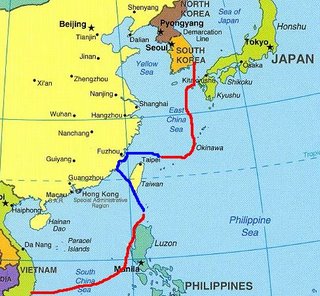 Taiwan is an interesting case of U.S. foreign policy. On the one side stands a small wealthy democratic island and on the other the would be Asian hegemon. At its most basic, we are confronted with a choice between pleasing the more powerful country versus defending the freedom of a small country. Rather than focus on the much discussed arguments over the morality or "legality" of either position (I would obviously prefer defending the small democratic nation), I will instead focus on the geographic and military reasons for defending Taiwan against China. Essentially, this is a straight balance of power analysis of the situation.
Taiwan is an interesting case of U.S. foreign policy. On the one side stands a small wealthy democratic island and on the other the would be Asian hegemon. At its most basic, we are confronted with a choice between pleasing the more powerful country versus defending the freedom of a small country. Rather than focus on the much discussed arguments over the morality or "legality" of either position (I would obviously prefer defending the small democratic nation), I will instead focus on the geographic and military reasons for defending Taiwan against China. Essentially, this is a straight balance of power analysis of the situation. 
There is probably no more important reason to defend Taiwan than plain geography. The island of Taiwan is a major constrictive influence on China’s ability to project power in East Asia. The map above crudely demonstrates this effect. The red lines represent where China is hemmed in by nations other than Taiwan. The blue line shows where China is blocked by Taiwan alone. Losing Taiwan to China would have many deleterious results for U.S. strategy. As can be seen, China is currently prevented from having reliable access to blue water. Without Taiwan, the Chinese fleet (PLAN) would have direct access to the great ocean of the world. The U.S. and Japanese navies would be placed in the unenviable position of hunting down major Chinese surface ships across the vast Pacific Ocean. The Chinese would further be free to maneuver, combine, and divide their major fleets as they see fit in a time of war. Presently the Chinese are forced to divide their navy into two essentially independent fleets north and south of Taiwan. With warplanes and missiles on Taiwan it would be extremely risky for them to maneuver their fleet in the Taiwan Strait. The Chinese navy would thus start any war divided and halfway to being conquered. The reverse is also true; a Chinese Taiwan would form a protective bubble over the central part of the western Pacific that would be dangerous for the U.S. Navy to enter. The American fleet would be forced to either operate too far away to support operations or accept higher casualties. Lastly, Taiwan is an excellent location from which to launch air and missile attacks on China. It is the closest piece of land to China we would have, and is midway between Shanghai and Hong Kong.
The main military reason to defend Taiwan, aside from geography-influenced ones, is attritional. Classic attritional warfare is taking a geographic feature cheaply that the enemy must pay dearly to retake. One example of this is Southern General Longstreet’s desire to disengage and move around the Union army at Gettysburg to take a position between it and Washington, thus forcing the Federals to pay the high price of attacking the Confederates instead of the other way around. The Chinese have so indoctrinated themselves in the belief that Taiwan must be restored at any price, that they are, well, willing to pay any price to take it. Militarily then, Taiwan is a rock against which we can break the Chinese military. Even in a best case scenario, an invasion and occupation of Taiwan would be extremely costly to the Chinese military. Of course, the goal would be to prevent a successful result for China, but whether successful or not, we would be in a far better position versus China after they have blown themselves in their effort to retake Taiwan.
The Taiwan situation seems to me to be very similar to a prior contested island, Heligoland. Heligoland is a small island in the North Sea off the German coast. It had been a British territory since 1807 but Kaiser Wilhelm had given Britain a free hand in several East African kingdoms in exchange for the island in 1890. Though it appeared at the time that the British had received the better deal (one German critic groused that the Kaiser had “given away the coat for a button”), by World War I it was clear the Germans had. Heligoland proved invaluable for the German High Seas Fleet by forming a bubble in the southeastern corner of the North Sea that was inaccessible to the Royal Navy. The German fleet could make darting attacks from this secure area and then race back when caught by superior British forces. Had the British still possessed Heligoland in 1914, it is unlikely the Germans could have operated their fleet for long. British spotters and cruisers would have kept constant track of German movement allowing the British to be quickly destroy them if they attempted any action. The Germans possessing Heligoland was one factor that led them to believe the British would not risk their fleet and Empire to blockade Germany; a dangerous assumption of British intentions. It is likely that a China who controlled Taiwan would also assume that the United States would not risk her fleet and global preeminence in a confrontation over East Asian affairs.
The one weakness that we must concern ourselves with is the Taiwanese people. They seem to believe that we will simply save them from any Chinese attack, so no reason to prepare to defend themselves. They spend a pathetic 2.4% on defense, less than half of what they should spend. They have yet to agree to the major arms package President Bush offered them in 2001. Their military is only now beginning to think about reforming to face a 21st Century attack. Though they are still valuable to us, we are simply not going to blast the Chinese out of the mountain caves of Taiwan to liberate the island. Also, the amount China must pay to take the island is directly linked to how prepared the Taiwanese are to defend their island. Clearly, in any conflict we want the price to be as high as is possible. It is arguable that supporting Taiwan increases the odds of war with China. I do not agree with that, but even if it is true, it is better to have a greater chance of a war that is in our favor, than a lower chance of a war in China’s favor.

No comments:
Post a Comment